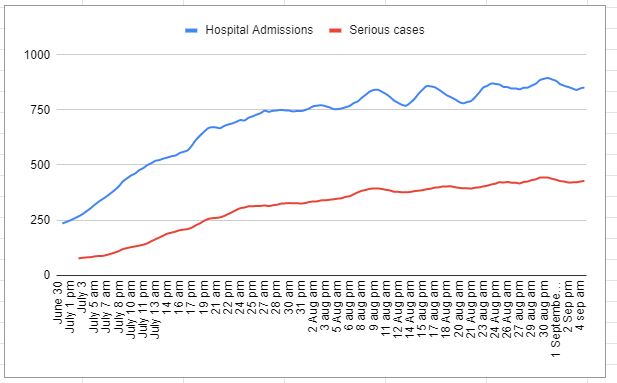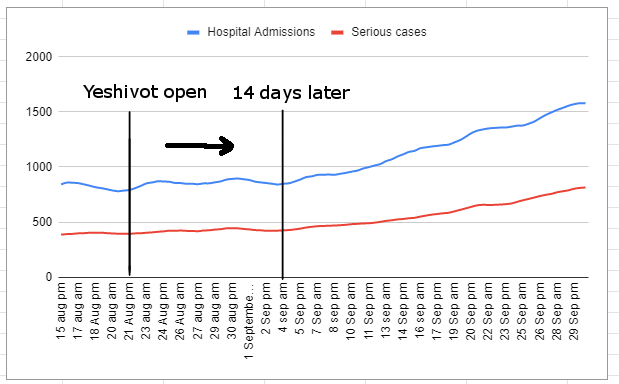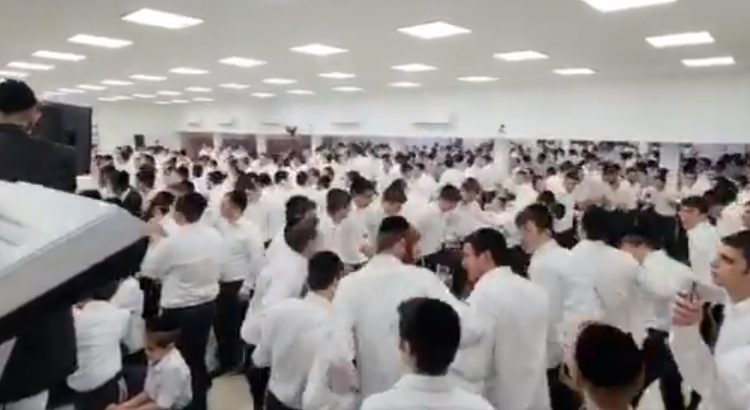I want to talk a bit about privilege.
Privilege is a buzzword on the progressive Left right now, where it means something like “the advantages you have in life”, I suppose. Or maybe “The disadvantages in life that you don’t have”. But that’s not what the word really means.
As I learnt from Terry Pratchett, privilege literally means “Private Law” (privi-lege). Privileges were once special laws that benefited a small group of people.
Israel’s growing Haredi community has long seen itself as a people apart with its own privileges recognised in law.
Most significantly, Haredim are exempt from Israel’s mandatory military draft. The Supreme Court ruled this exemption unlawful in the 1990s, and multiple Israeli Governments have fallen as Haredi parties collapse coalition after coalition to ensure that the legal situation is never rectified. More than 20 years later, Haredim are still, in effect, exempt from the draft.
This privilege, so zealously defended by the Haredi political parties and the politicians that seek their favour, sends a message to both the Haredim and the rest of Israeli society: “You don’t have to give what everyone else is expected to give. You are exempt. You are more important.”
Throughout the coronavirus crisis, Haredim have won other privileges. When education first closed down during the spring lockdown, Haredi institutions were exempt. When Ukraine banned foreign visitors, the Prime Minister appointed a committee of senior ministers with a mandate to try and get more New Year pilgrims permission to attend Rebbe Nahman’s grave in Uman.
But the newest Haredi privilege, and the most significant for Israel’s ability to withstand the pandemic, is the “Capsules deal”.
In early August, Israel was finally seeing some success in containing the rise in Covid-19 cases after a sharp increase in July. Cases continued to rise in Arab communities after mass Eid al-Adha gatherings at the end of July, but among the rest of the country, infections were actually falling. In retrospect, limits on gyms and restaurants that stopped short of full closures, and stricter rules on weddings, seemed to be doing the trick.

Then, on 21 August, the residential Yeshivot were allowed to reopen according to a new arrangement, the “capsules deal”.
I wrote about the Capsules Deal here. Essentially, students were divided into groups of 50. Each group, each capsule, was considered to be a ‘nuclear family’ and exempted from masking, social distancing and physical distancing. Each capsule was supposed to interact with nobody else, securely sealed away, and keep to a separate section of the study hall.
In reality, the capsule deal was mostly smoke and mirrors. Inside the study hall, keeping a little apart doesn’t stop superspreader-type infection events.
Outside, the capsules weren’t enforced and students mixed both between capsules and with their families, went to shops, attended weddings and generally acted freely. More freely, in fact, than anyone else, because the privilege of the capsule deal, with its conditional exemptions from masks and distancing, seems to give them permission to do whatever they wanted. Capsules became a convenient legal fiction rather than a reality.
Within 14 days of the Yeshivot returning, infections jumped and hospitalisations too.

Non-Haredi schools restarted, in a limited fashion, on 1 September, but that’s not enough time to be responsible for the rise in seriously ill people. The much-discussed protests had been happening for months. No, this was the yeshivot.
The Government responded by locking down the whole country as infections spiralled out of control. Workplaces and shops closed. Home hosting was banned. Schools, of course, were shut. But the Yeshivot carried on as before. No masks, no distancing, no closures. Meanwhile, infections among yeshiva-aged boys spiked and began to spread to other demographics.
On Monday evening, after Yom Kippur, with the rest of the country tightly locked down, Yeshiva students were allowed to travel home for the Sukkot vacation. But first, they partied.
בישיבת ‘עטרת שלמה’ בראשון לציון הקדימו את שמחת בית השואבה להערב עם הזמר זאנוויל וינברגר והקלידן רפי שטיין הבחורים זכו ללמוד למעלה מ 40 יום בקפסולות וחוזרים בריאים לבין הזמנים pic.twitter.com/m4D6BFk2Jb
— משה ויסברג (@moshe_nayes) September 28, 2020
The scene above is from the Ateret Shlomo Yeshiva in Rishon LeZion. The police broke up another event in the headquarters of the Vishnitz Hassidim in Bnei Brak.
המשטרה לא יודעת לאכול את ויזניץ pic.twitter.com/HaVRFP6Z5M
— ציון גניש Z.G (@Or9uTUMESQcdtK9) September 28, 2020
As the police dispersed the party, the Vishnitz Rebbe protested, insisting that the event was allowed because of the Capsule Deal. Because once you have privilege, it takes you outside the rules. Laws are for other people.
When it comes to synagogues, another ‘capsule deal’ was cooked up to keep indoor prayer happening despite the heightened risks of crowding, shouting, singing, air conditioning and lack of ventilation. But plastic partitions and masks have their limits, especially for the many hours of High Holy Day prayers. Jerusalem hospitals are already filling up with cases traced back to Rosh Hashana infections.
And, of course, the capsules for those pilgrim who made it to Uman were equally successful, as seen in this video.
חסידי ברסלב באומן בריקודים סוערים באוהל של שיינר
— משה ויסברג (@moshe_nayes) September 20, 2020
(צילום: שרוליק וולס) pic.twitter.com/Tjk3NlCJjY
Israel enters the Sukkot festival with tens of thousands of Yeshiva students back at home, many carrying the virus to seed to their families.
Unlike schools, Yeshivot have still not been closed and, as it stands, will be allowed to restart as normal in a week or two when their break is over.
Perhaps we would have got here anyway. Perhaps reopening schools alone, even with the limits on class sizes and classroom days for older kids, would have been a step too far and increased the spread of the coronavirus to the same uncontrollable levels we have now. I don’t know.
But I do know, now, that the privilege granted to Yeshivot that effectively exempted them from all coronavirus rules was big enough to force the entire country into a full lockdown within a month. And I know that that privilege hasn’t been revoked.
Until Israelis of all sectors live under the same law, without special privileges for politically powerful communities, we’re going to have to get used to lockdowns, watching the videos of Yeshiva parties from our houses because we aren’t allowed outside.

Would you say that at least part of the problem is that we can’t call a spade a spade? Why can’t the authorities say, “The problem is here, so we’re not going to impose as many restrictions there?”
Interesting question. The Deputy Health Minister addressed it at the Knesset’s Constitution Committee today, actually. He said it was politically impossible to introduce differential measures to target virus hotspots because whichever community or group that was targeted would object.